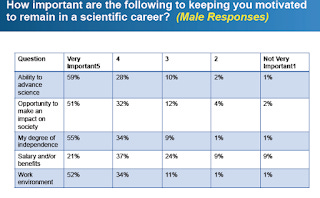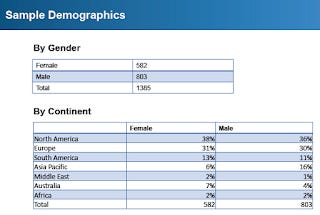What it means to be a scientist: male
The Science Advisory Board, an international network of science and medical experts, has just published the results of a study on global science that sheds some interesting light on what it means to be a woman in science--particularly in the light of the #distractinglysexy debate.
With the caveat that that I have not dived deeply into the survey methodology, SAB report that female scientists in their survey are more likely to be dissatisfied with salary/benefits, job availability, gender barriers, and how they feel valued as scientists than their male colleagues. The study was part of a Global Science survey that sought feedback from people about why they became scientists and what it is like to be a scientific professional.
“We originally set out to look at what it means to be a scientist,” said Quentin Kreilmann, Science Advisory Board Community Manager. “We found two narratives depending on gender, one of which comes with additional challenges.” The Global Science 2015 survey sample includes 1,478 respondents, 58% men and 42% women, from North America, Europe, Asia, and South America.
The study results showed that some women see gender as a barrier to pursuing a career in science, whereas men did not. When asked, “based on your experience, what do you perceive to be the biggest barrier to pursuing a career in STEM,”15% of female respondents selected gender, compared with only 2% for their male counterparts. Women also report gender inequality after attaining scientific positions.
SAB is working on getting the report put online. In the meantime I have taken screenshots of the most interesting graphics.











